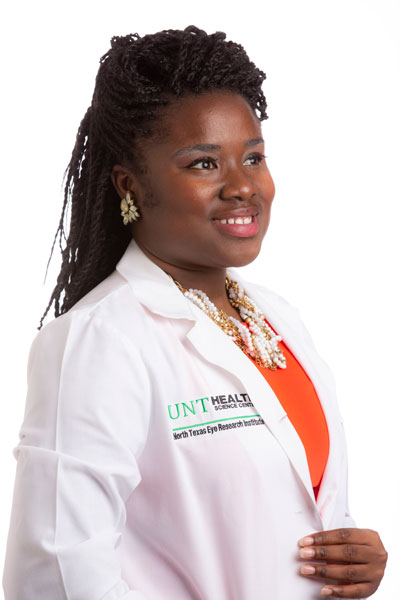National Research Mentoring Network helps young researchers meet their goals
By Jan Jarvis

Doctoral student Amanda Roberts knew where she wanted to go with her career, but she was uncertain how to get there.
“I hoped to get to the right people, but I didn’t know the ins and outs of the National Institutes of Health, and cold-calling didn’t seem to be the way to go,” Roberts said. “I had to wonder what the best route was for me.”
Presenting her doctoral research project on glaucoma disease at the Texas Conference on Health Disparities at UNT Health Science Center helped her fast track her career.
After meeting Alexis Short, Digital Communications Strategist for the National Research Mentoring Network, Roberts learned about career and professional development opportunities. Since 2017, the PhD candidate has been an active mentee and mentor. She has cohosted and facilitated a career-development webinar and contributed to several newsletters with more than 22,000 subscribers.
A $5.3 million grant from the National Institutes of Health is helping Roberts and others achieve their career goals.
Since 2014, when the National Research Mentoring Network was initiated at UNTHSC, it has reached more than 13,000 mentees and mentors, said Associate Director Damaris Javier. The program focuses on diversifying the scientific workforce by encouraging individuals from underrepresented groups to start and stay in biomedical careers.
“NRMN gives mentees from underrepresented groups at all career stages a way to find and network with mentors and peers nationwide to achieve their academic and research goals,” said Jamboor K. Vishwanatha, PhD, Regents Professor and Vice President, Founding Director, Texas Center for Health Disparities, Principal Investigator, the National Research Mentoring Network.
Nationally, the number of faculty members from underperesented groups in the biomedical sciences has remained stagnant for about 30 years. Researchers from minority backgrounds are not as successful at securing large NIH grants when compared to their peers.
Yet the need is growing. By 2050, less than 50 percent of the general population will be non-Hispanic whites, but the nation’s scientists will remain a homogeneous group. Certain racial/ethnic groups (African Americans, Hispanics, Native Americans, and Hawaiian/Pacific Islanders), women, individuals with disabilities, and socioeconomically disadvantaged individuals are persistently underrepresented in the research workforce.
Roberts got the chance to be mentored by several scientists, including one from the the NIH who offered insight about research, funding opportunities and networking.
“Instead of having to cold call researchers, my NRNM mentor helped me get to the right people,” she said. “It makes such a difference knowing someone who is in the system and knows the ins and outs.”
Since getting involved in the NRMN, Roberts said she has gained more confidence in her writing and started a blog to help undergraduate students.
While mentees benefit from the encouragement they receive, being a mentor is also rewarding, said Robert Mallet, PhD, Professor of Physiology and Anatomy.
“Mentoring is among the highest callings for faculty,” said Dr. Mallet, a NRMN mentor for many years. “We were all mentored and helped along the way, and I feel I have a responsibility to do the same for others.”
After more than three decades of research and teaching experience, he knows the challenges that junior faculty members face and how to help scientists overcome them.
“Getting that first grant is very hard,” he said. “A mentor can help early-career colleagues learn to present their ideas in a compelling way.”
There are two things that a researcher needs to demonstrate when applying for a grant, he said. First, they need to show why the work is important, and second, they must demonstrate that the work is feasible.
“If they can do those two things, two-thirds of the battle of grant writing is done,” Dr. Mallet said.
Supporting bright young students and addressing disparities in the biomedical workforce is especially rewarding, he said.
Roberts said she is grateful for the opportunity to network with researchers who continue to mentor her to reach her career and research goals.
“It’s such a successful program,” she said. “It really lives up to to its name.”






Social media